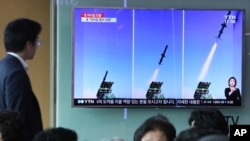U.S. and Chinese diplomatic and defense chiefs will meet Wednesday for a security dialogue that Washington says will focus on curbing North Korea's nuclear and missile programs.
The talks in Washington will involve U.S. Secretary of State Rex Tillerson and Secretary of Defense Jim Mattis, as well as China's top diplomat, State Councilor Yang Jiechi, and General Fang Fenghui, chief of state of the People's Liberation Army, the U.S. State Department said.
It will be the inaugural session of the U.S.-China Diplomatic and Security Dialogue, a framework launched by President Donald Trump and Chinese President Xi Jinping during a summit in Florida in April.
The State Department said the aim was "to expand areas of cooperation while narrowing differences on key diplomatic and security issues."
U.S.-China ties have warmed since the April summit, in spite of continued U.S. concerns about China's pursuit of territory in the South China Sea and a large trade imbalance.
Tillerson has said North Korea will top the agenda next week and made clear that Washington wanted more help from China in pressing Pyongyang to abandon its weapons programs, calling Chinese efforts so far "notable" but "uneven."
The focus on North Korea has been sharpened by dozens of North Korean missile launches and two nuclear bomb tests since the beginning of last year.
North Korea says it is working to develop a nuclear-tipped missile capable of hitting the United States, and this week Mattis called it the "most urgent" threat to U.S. national security.
China is party to U.N. economic sanctions on North Korea.
But it remains the country's main ally and trading partner and has been reluctant to impose the sort of punishing measures experts say are needed to get Pyongyang to abandon its weapons programs.
On Tuesday, Tillerson said Washington was considering imposing "secondary sanctions" on foreign firms doing business with North Korea and had been in discussions with Beijing about the activities of entities inside China.
A Washington think tank said this week that North Korea's effort to circumvent sanctions was complex but could be defeated by targeting relatively few Chinese firms.
The U.N. Security Council expanded targeted sanctions against North Korea this month in the first such resolution agreed by the United States and China since Trump took office.
Washington has been pushing for even tougher steps, including an oil embargo, bans of North Korea's airline and overseas workers, and interception of its cargo ships.






